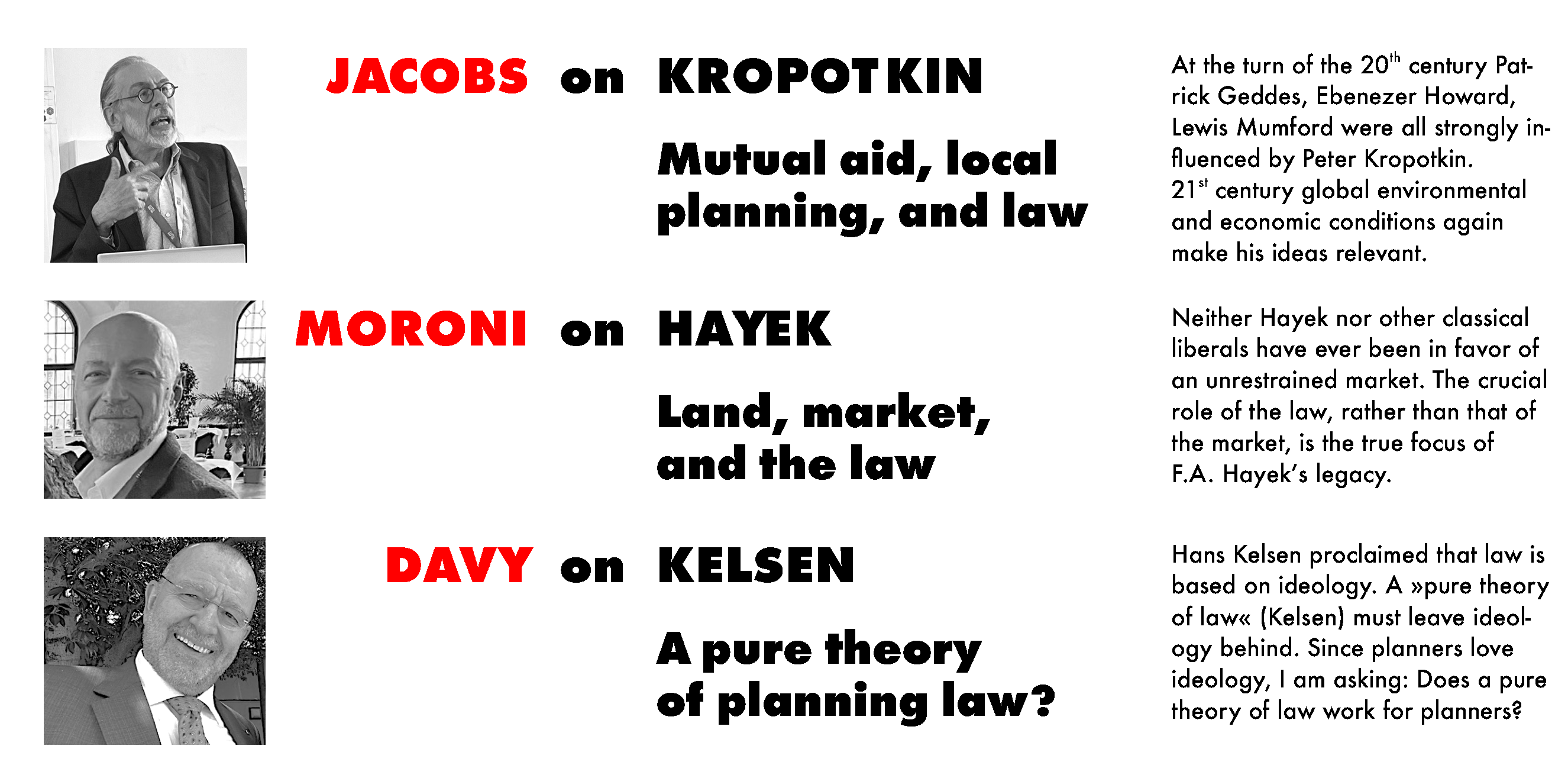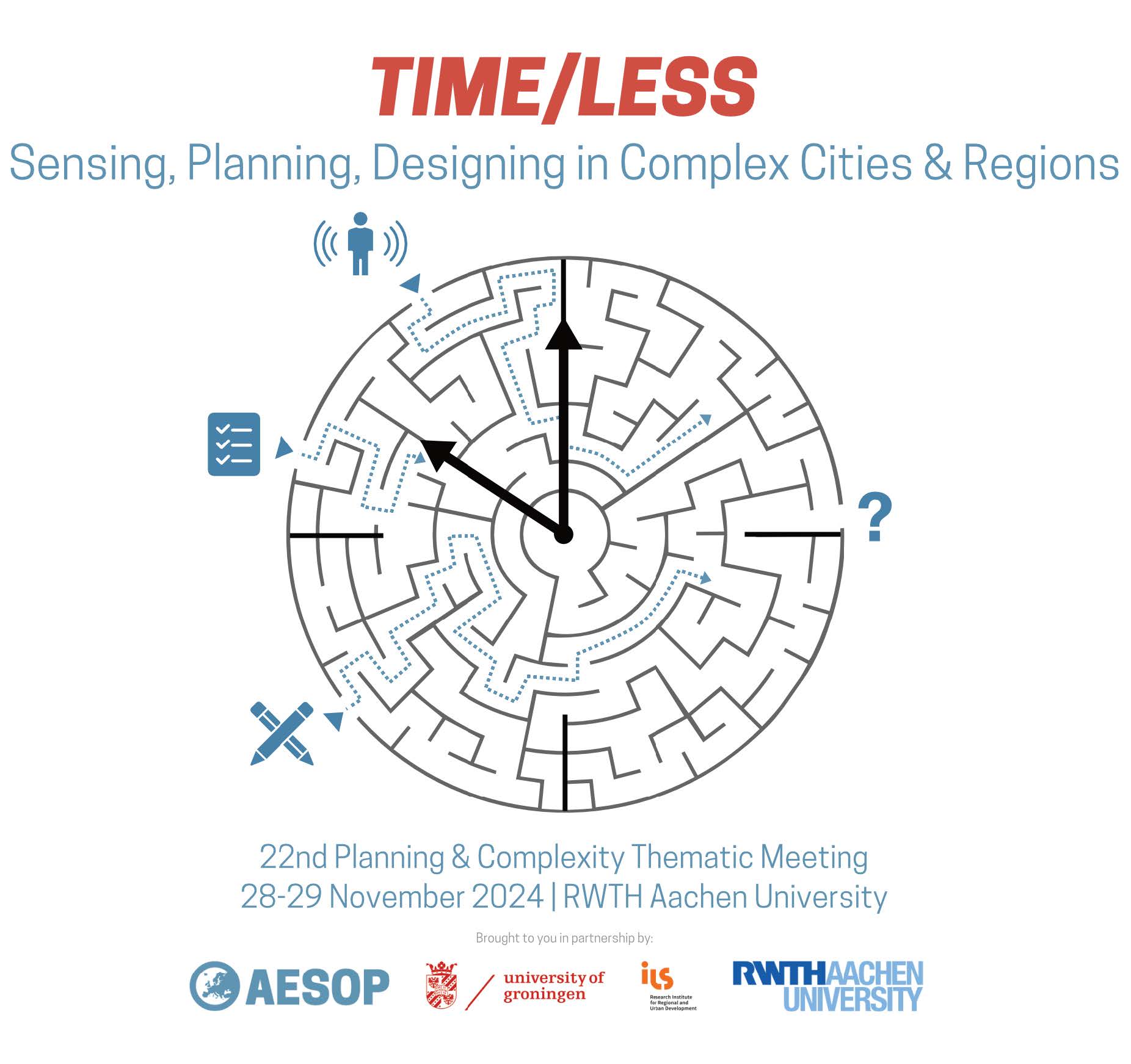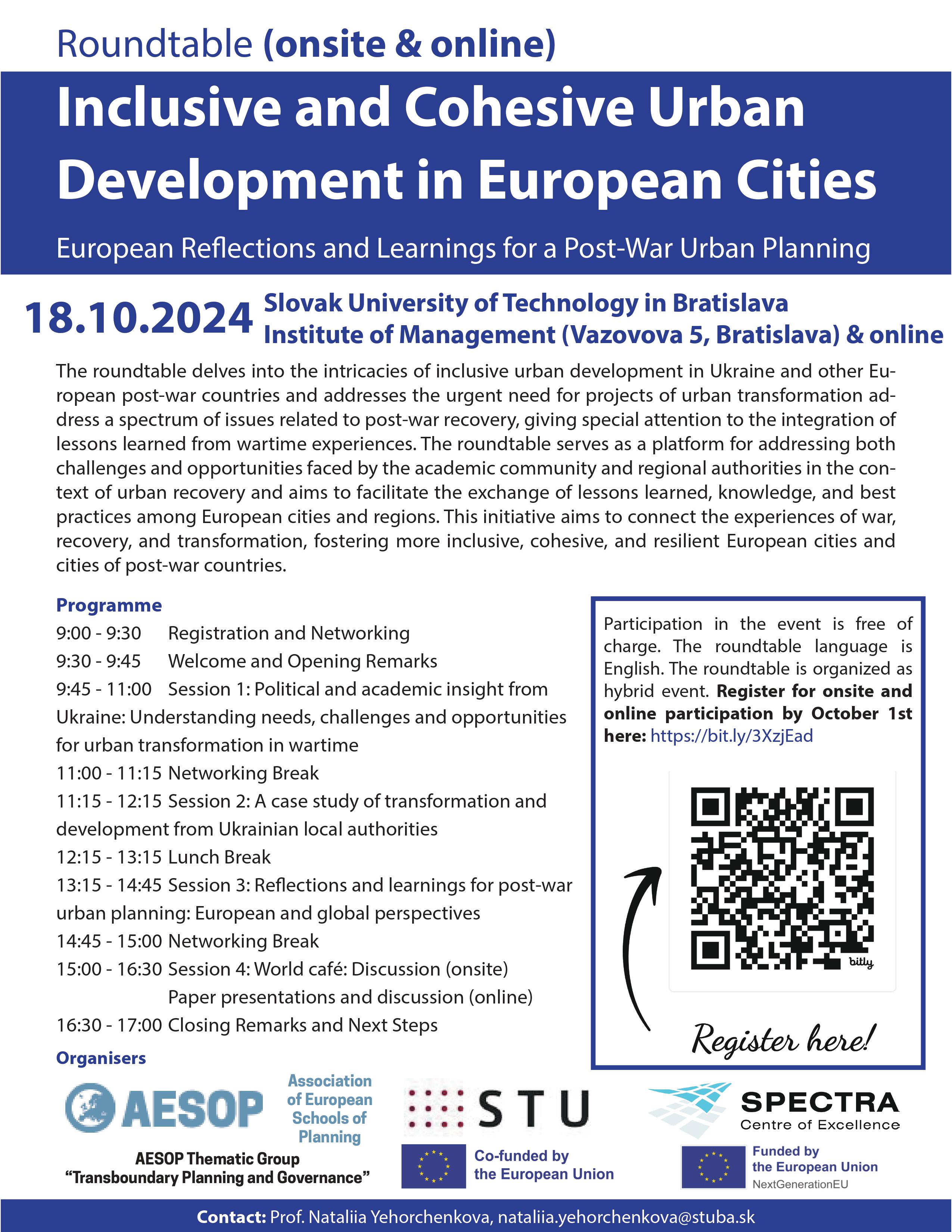THEMATIC GROUPS
- Details
- Parent Category: THEMATIC GROUPS
- Category: Planning Theories
AESOP Thematic Group on Planning Theories (plural)
AESOP Thematic Group on Ethics, Values and Planning
International Academic Association on Planning, Law, and Property Rights
10 October 2024, 4—6 p.m. CEST (online)
Please register at

- Details
- Parent Category: THEMATIC GROUPS
- Category: Planning and Complexity
TIME/LESS: Sensing, Designing, Planning — the motto for the events that take place over the course of 2024! On the one hand, this title stresses the implications of (not) thinking about time both from theoretical and empirical perspectives, through the lens of sensing, designing, and planning. On the other hand, it reflects on and questions the timeless character of the conventions, practices, and patterns that are (not yet) affected by the passage of time.
We are looking forward to involving our existing network and invite new faces in a diversity of formats, online and offline. Registration for our annual workshop in Aachen in November is closed (see detailed information below), but we have are proud of inviting everyone to an online talk before.
Pre-Conference Seminar, 16 October 2024 (online)
"The discipline of time"
Dr. Jorren Scherpenisse
Date: Wednesday, 16 October 2024
Time: 16:30-17:30 (CET)
Zoom Link: https://rwth.zoom-x.de/j/68050529767?pwd=YYexmQfYPQCJrZdnrRREYgDUwmpZ00.1
To kick-start our thoughts and discussions, Dr. Jorren Scherpenisse will give an online talk on the role of time in decision-making processes and the importance of temporalising public governance. Scherpenisse conducts research in the public sector. His research is focused on political-administrative issues, with a special interest in temporality, long-term policymaking, complexity, governance modes and accountability. He received his PhD from Utrecht University in 2019 for his dissertation ‘The discipline of time: on temporalising public governance’.
Scherpennise is an organizational psychologist and public administration scholar. He works at the Netherlands School of Public Administration as a senior researcher, co-dean of the executive Master of Public Administration and deputy director of the Thinktank. He also teaches in diverse educational executive programmes for professionals in the public sector.
TG Conference, 28-29/30 November 2024 (Aachen, Germany)

We are happy about a huge number of more than 40 active members of our group, with various thought-provoking contributions. This leads to two days full of exchange and programme, including key notes, book launches, and social events. There is an optional excursion through Aachen inner city the following Saturday after the end of the workshop itself.
This conference seeks to deepen our understanding of intricate socio-spatial configurations and changes by studying their timing, speed, sequence, durability, and the enduring or fl eeting impacts they leave. It welcomes the exploration of dynamics and methodologies characterized by time-sensitive interests. It invites scholars with interdisciplinary backgrounds to delve into innovative analytical, design, and planning methods that can empower planners, policymakers, and designers to better understand and use time in addressing contemporary urban challenges and opportunities across various scales.
View and download more information, draft programme, and the full book of abstracts here:
https://edu.nl/e437h (as of 24 Sep 2024)
The conference in Aachen (Germany) and will be hosted by RWTH University. Due to its central location, bordering Belgium and The Netherlands along with its vicinity to multiple major cities, it is highly accessible. The event is organised by Fabio Bayro Kaiser and Stefano Cozzolino (local organising team 2024), with support from Christian Lamker and Ward Rauws (thematic group coordinators).
Agile & Democratic Affordances: A Prototype Testing and Evaluation Workshop, 28 Nov 2024 (Aachen, Germany)
In parallel to the TIME/LESS event, there will be a Prototype Testing and Evaluation Workshop exploring time-sensitive and digital approaches to public engagement. This event is organised by the project Agile and Democratic Affordances in Aachen (Project ADAA) with an interdisciplinary team in collaboration with the student-driven prototyping initiative called TAkt. This workshop is a part of a series of exploratory and experimental activities designed to test and evaluate an interactive screen with bespoke software features foregrounding sustainability and energy concerns in the city of Aachen. We will be working with guest expert Prof. Dr. Filipa Matos Wunderlich from the Urban Design Research Group at Bartlett School of Planning, UCL.
Participants of the workshop will engage with a novel device that is not yet implemented for digital participation processes. At the same time, participants will help us understand which features and perceived experiences or embodied and interactive impressions may improve the prototype.
Workshop Details:
Thursday, 28th November 2024, 12:00 –16:00
Rooms 317 & 314 in the Seminargebäude, Wüllnerstr. 5b, 52062 Aachen
Please register before 11th October 2024 via the link: https://www.soscisurvey.de/project-adaa/
Participation is limited and will only be guaranteed for on a first come first serve basis. For more details contact: Robin Chang, Email:
Stay in Touch
We invite you to join our new LinkedIn group and also share relevant information and debates there. Visit at https://www.linkedin.com/groups/12735445/
- Details
- Parent Category: THEMATIC GROUPS
- Category: Transboundary Planning and Governance
Register now for our hybrid event "Inclusive and Cohesive Urban Development in European Cities: European Reflections and Learnings for a Post-War Urban Planning" on October 18th: https://bit.ly/3XzjEad
See below for details and programme. We would be extremely happy to welcome you in Bratislava or online!
Organised by Slovak University of Technology in Bratislava, SPECTRE Centre of Excellence, AESOP& Thematic Group "Transboundary Planning and Governance"


- Details
- Parent Category: THEMATIC GROUPS
- Category: Ethics, Values and Planning
10 October 2024, 4—6 p.m. CET (online)
Please register at
This event is organised in collaboration with the AESOP TG on Planning Theories.
JACOBS on KROPOTKIN - Mutual aid, local planning, and law. At the turn of the 20th century PatrickGeddes, Ebenezer Howard, Lewis Mumford were all strongly influenced by Peter Kropotkin. 21st century global environmental and economic conditions again make his ideas relevant.
MORONI on HAYEK - Land, market, and the law. Neither Hayek nor other classical liberals have ever been in favor of an unrestrained market. The crucial role of the law, rather than that of the market, is the true focus of F.A. Hayek’s legacy.
DAVY on KELSEN - A pure theory of planning law? Hans Kelsen proclaimed that law is based on ideology. A »pure theory of law« (Kelsen) must leave ideology behind. Since planners love ideology, I am asking: Does a pure theory of law work for planners?
- Details
- Parent Category: THEMATIC GROUPS
- Category: Global South & East
Dear all,
We are delighted to share the news that AESOP ExCo and CoRep have approved our thematic group proposal to organise AESOP International PhD Workshop in India as a mainstream AESOP event in 2026/27. In the future, we plan to organise similar workshops aligned with the years of Global Planning Congresses in the Global South and East countries.
With regards and thanks
Global South and East thematic group

